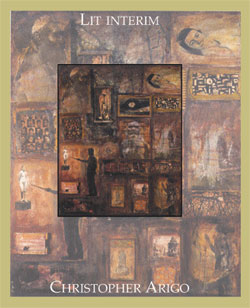
Christopher Arigo
Lit Interim
Winner of the Pavement Saw Transcontinental Award as chosen by David Bromige
ISBN 1-886350-71-x
8 by 9, perfect bound, 88 pages, $12
I chose this submission because of all the brilliant competition it
was the one I most wanted others to read. Christopher Arigo, I think, most convincingly questions aside. It is no new thought that poetry is here to govern thought (I am thinking of machinery), to moderate its mechanistic excesses; in short, as an evolutionary necessity, to prevent us from thinking ourselves to death. In this light, poetry's alliance with humor becomes more visible, for we laugh at mistakes while rationality maintains its insistence, inflexible as a government propagandist, that we make none---none, leastwise, that our, naturally, unacknowledged, cupidity , won't excuse.
From the outset I felt myself in the presence of a master, one who counted syllables without self-consciousness, who trusted in his bondwith language, in its manifest physicality, to show him the way. His use, and disobedience, of the 8-syllable line, that warrant of stability, has us speak volumes, breath quickening or slowing, either way keeping us alive to the hospital setting. For words are merely that, words without the in-form-ative sensibility directing them. Sensibility? Imperative! For it becomes a matter of life or death, as Arigo emergency ward setting from the outset reminds us-- an alert echoing throughout the book.
I admire this book for many of its attributes: its sense of form, its sense of humor (though the reader will find no belly laughs), the exacting location of its poetic I (masterful while unobtrusive), and for its unremitting mindfulness that a culture in crisis allows it to live, that a condition as far from chaos as facism is from maypole dancing, affords its poet his one opportunity-- notwithstanding the stifling opportunism of the day. Our culture is held here, this poetry blooms like a beautiful mold that is fed it but could not be predicted by it. As Arigo writes at the end of "Nocturnal Studies"," Sleep ruptures here and the very darkness/ you fear may redeem you." This is how I feel about this book, this Lit(erary) Interim. Congratulations to its maker!
--David Bromige
A dense new apocalypse of vivid, relentless images, Christopher Arigo's debut volume is yet rich and somehow hopeful. Inventing enthnographies, drawing on Da Vinci's flying machines, and generally re-mixing history, these poems draw from diverse sources to depict a world in dissolution, but gorgeously so.
-- Cole Swensen
Christopher Arigo is an investigative poet, and his method is an unprecedented visionary forensics. Every one of these poems comprises a scene of shocking dispossession which, by virtue of Arigo's method, becomes serene, sometimes even sublime. We find ourselves in a very new place indeed-- "The interim between having/and trees swept by wind."
--Donald Revell
----------------
(3) Via omission
Via admission I omit
most evil. Jokes with-
out punch lines. Bond
between earth & boundó
the curse of hierophants.
Astronomers disdain con-
fusion with lesser echelons
of prediction & have lost
all sense of tragedy--
the funniest joke of all
is tragedy, sensing all
lust, halved predictions
of echelons lessened by
fusion. Disdain astrologers,
hierophants. Cure the
bound-to-earth. Between
bonds & lines punched out
with jokes--evil mostly--
I must admit omission.
----------------
Some of these poems have appeared in various journals, sometimes in slightly different forms: Phoebe, Fourteen Hills: The SFSU Review, Whiskey Island Magazine, Fine Madness, Dine, Pleiades, and Pavement Saw
Read a review of this book at BOOKSLUT.COM


